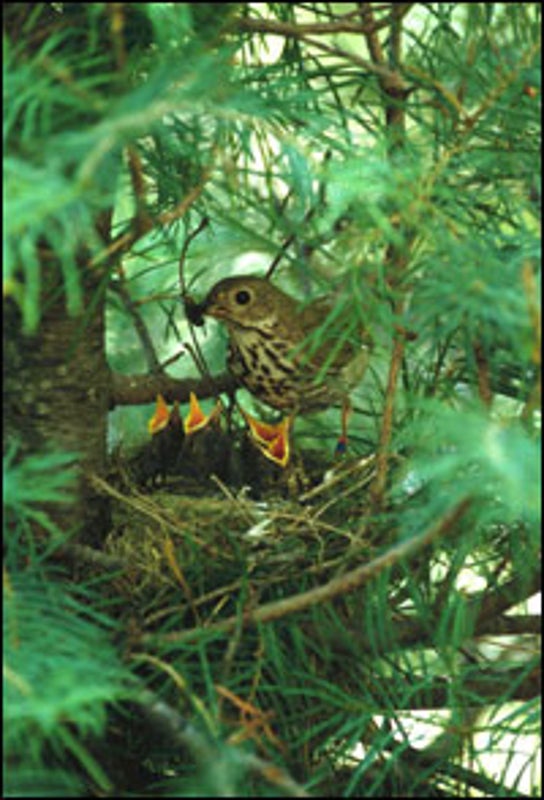Do Mama Birds Actually Reject Babies That Humans Have Touched

It's a familiar summertime scenario: a nest rests in the low crook of a crab apple tree tree. Inside, a babe oriole stretches its wings, attempting to trill. A fiddling girl's face looms overhead. She reaches out her jumbo finger to stroke the still-wet feathers. Simply before contact, her male parent's vocalization booms: "Don't touch that bird!"
According to folklore, birds will reject their eggs and immature if humans accept so much every bit laid a finger on them. This prevalent conventionalities, nevertheless, is for the birds: it denies animal parents' innate drive to nurture their broods and ignores a bird'due south basic biology.
No matter how flighty birds appear, they do non readily abandon their young, peculiarly not in response to human touch, says Frank B. Gill, quondam president of the American Ornithologists' Union. "If a bird's nest is disturbed by a potential predator during the nesting or egg-laying stage," he says, "there's a possibility that [it] will desert and re-nest. Notwithstanding, one time the young are hatched and feeding, [their parents are] by and large pretty tenacious."
The myth derives from the belief that birds can notice homo scent. Actually, birds have relatively small and elementary olfactory nerves, which limit their sense of smell. There are very few birds with extraordinary olfaction and these represent specialized adaptations. For example, turkey vultures are attracted to methyl mercaptan, a gas produced by decaying organic matter (and added to natural gas to get in smell bad), while starlings can detect insecticidal compounds in vegetation, which they apply to keep their nests issues-free. Yet no bird's sense of smell is cued to human scent.
Nevertheless, there's skillful reason not to become fiddling around in an occupied nest. "The fact is, birds don't abandon their young in response to impact, [but] they will abandon [their offspring and their nest] in response to disturbance," explains biologist Thomas Due east. Martin of the University of Montana and the U.Due south. Geological Survey, who has handled birds from Venezuela to Tasmania without instigating abandonment. "They are likely responding to disturbance in relation to take chances of damage to immature."
In other words, birds, similar economists, make toll-do good decisions. If a bird has invested a lot of fourth dimension and free energy in hatching and rearing its young, that bird is more likely to, if possible, relocate its offspring to a new nesting site, rather than abandon them altogether when a potential predator has discovered the babies. Birds that live longer, like hawks, are more than balky to hazard (and more than sensitive to disturbance) than short-lived birds, like robins and other songbirds. The former might abandon its young, while the latter is much less probable to exercise so.
The same logic applies to most animals. "In general, wild animals bond with their immature and do not quickly abandon them," explains Laura Simon, field director for the Urban Wildlife Plan at the Humane Social club of the U.s.a..
In fact, about creatures notice boggling ways to ensure the survival of their immature. Killdeer and ducks will feign a cleaved fly to lure a predator abroad from their babies, and raccoons and tree squirrels will speedily relocate their progeny to more protected pastures when a potential threat is skulking about.
Wild rabbits are the exception to this rule. "These animals seem to be the most sensitive to human and other smells. They're a flighty, loftier-stress species," Simon says. "Wild rabbits will sometimes abandon their nest when it'south been very disturbed equally when a lawnmower [runs information technology over or a] cat gets into it."
If you suspect that a rabbit'southward nest has been abandoned, the Humane Lodge recommends making an "X" out of yarn or string over the nest and checking approximately 10 hours later to see if information technology has been moved. If the X has been pushed aside but the nest is still covered, that's a adept indication that the mother has returned, nursed her young, and then re-covered them. If the X stays in place for 12 hours after the traumatic event, it's probable that the young rabbits have been deserted.
Of form, wildlife should be left undisturbed as much every bit possible. The general rule for finding a baby bird or any animal infant on the basis is simply to leave them alone. Most oftentimes, the parents are watching from a altitude. But if a baby bird is institute on the ground without its fledgling feathers and the nest is easily within attain, it tin exist returned without damage. The parents volition welcome information technology back with open wings.
grimwadeagetwoubding.blogspot.com
Source: https://www.scientificamerican.com/article/fact-or-fiction-birds-abandon-young-at-human-touch/
